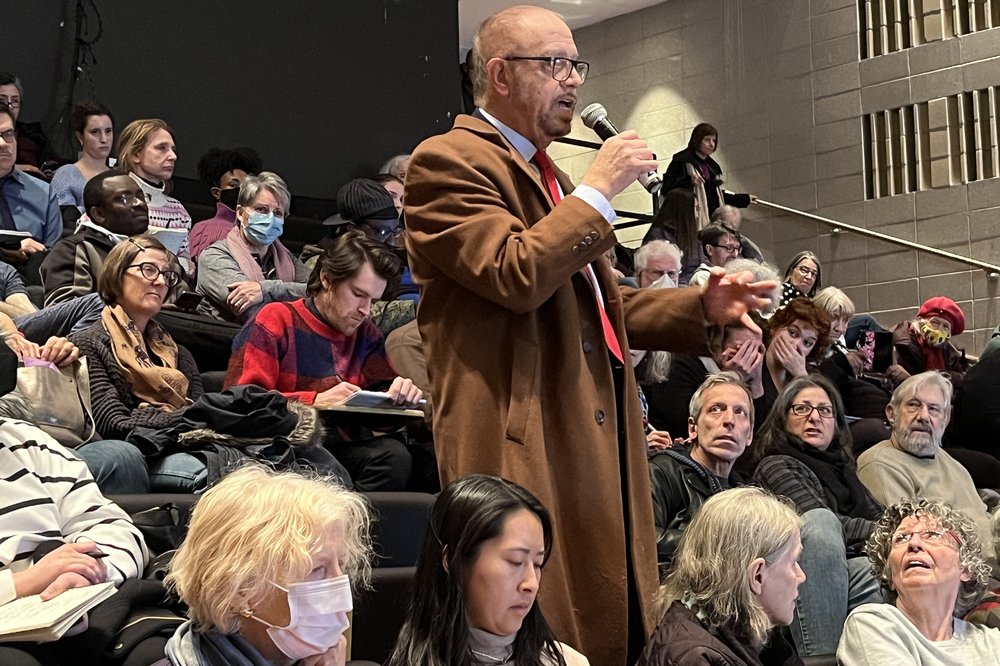Beth Israel hospital services to end sooner than expected, despite residents' objections
Nov. 30, 2023, 7:01 a.m.
Beth Israel is planning to stop taking certain cases by mid-December and move inpatient elective surgeries to other facilities in the Mount Sinai Health System starting in January.

Mount Sinai Health System is accelerating its plan to close the Beth Israel hospital on the Lower East Side — drawing criticism from elected officials, residents and hospital staff who say the community depends on the hospital's services.
The health system had already shared a plan with the state health department in late October saying it would close the medical center in July 2024 and gradually reduce its capacity leading up to that date. But earlier this month, Mount Sinai issued an addendum that ends some Beth Israel services by the end of this year.
“This is personal,” Barbara Caporale said on Tuesday night at a forum at Baruch College, where community members spoke out against the closure plan and stepped-up timeline. “My kid was born here. My father has a stroke, a heart attack, he comes in, he gets service, he goes to the ICU. You need a hospital where families can come and visit.”
But Mount Sinai says reducing the hospital's services is a matter of patient safety. Beth Israel “is already experiencing decreased patient utilization and has received a number of staff resignations as result of the planned closure that, coupled together, will impact on the delivery of services,” according to the addendum.
Some of the changes are imminent. For instance, Beth Israel is proposing to stop taking all elective cardiac catheterization and interventional radiology cases by mid-December and to move all inpatient elective surgeries to other Mount Sinai facilities starting in January.
The state still must approve the health system's closure plan before it can be finalized. A spokesperson for the state health department said it couldn't comment on that process while the plan is under review.
Mount Sinai officials said the closure is unavoidable because of Beth Israel’s financial losses. The hospital is slated to lose $150 million this year, according to the closure plan.
“The issues are long-term and systemic and the status quo cannot hold,” Elizabeth Sellman, president and chief operating officer of Beth Israel and Mount Sinai Downtown, said at Tuesday's forum.
A cohort of elected officials representing the Lower East Side, including City Councilmember Carlina Rivera and state Assemblymember Harvey Epstein, said they want to help Mount Sinai find a way to save Beth Israel — for instance, by having it designated as a “safety net” hospital to get more financial support from the state.
But hospital officials have already tried for more than a year to work with the state health department on that strategy without success, said Brad Beckstrom, the health system’s vice president of community and government affairs. He said the hospital doesn't treat the required number of patients on Medicaid to receive safety net status.
Some Beth Israel staff who spoke at the meeting urged Mount Sinai to invest in the hospital and enhance services to bring in more patients and money, rather than reduce services. But officials said they had already made their decision.
Mount Sinai has committed to finding other jobs elsewhere in the health system for all unionized staff at the hospital but has not made a similar promise to non-union staff.
Beth Israel, which is now located on East 16th Street, first opened on the Lower East Side in the late 1800s. In 1997, it merged with St. Luke’s Hospital to create Continuum Health Partners, and that company merged with Mount Sinai in 2013.
Three years later, Mount Sinai announced plans to greatly downsize Beth Israel while expanding outpatient services downtown, saying the demand for inpatient hospital care had decreased. But the plans were scrapped amid the need for beds during the COVID-19 pandemic, officials said at the forum on Tuesday.
Since the health system acquired Beth Israel, patient volume there has declined significantly. Emergency department visits decreased by 42%, from 122,000 in 2012 to 70,252 in 2022, according to Mount Sinai’s closure plan.
In defending the closure plan, Mount Sinai officials emphasized they have an outpatient facility near Union Square with a range of specialties, as well as a behavioral health center and an urgent care site in Downtown Manhattan.
But some residents said there was no replacement for a fully functioning hospital with an emergency room.
“How dare you do something like this?” said Stuyvesant Town resident Arlynne Miller. “What I really want to know is, can this hospital be sold to somebody else who would like to run it as the hospital it used to be?”
Hospital officials didn't respond to Miller's suggestion. But Beckstrom said Mount Sinai is beginning to coordinate with other hospitals, including Bellevue — located about 10 blocks north — to receive patients who otherwise would have gone to Beth Israel.
Beth Israel Hospital Will Downsize To A Fraction Of Its Current Size State investigation of baby’s death at Mount Sinai NICU underway Mount Sinai, early-career doctors avoid strike in tentative deal